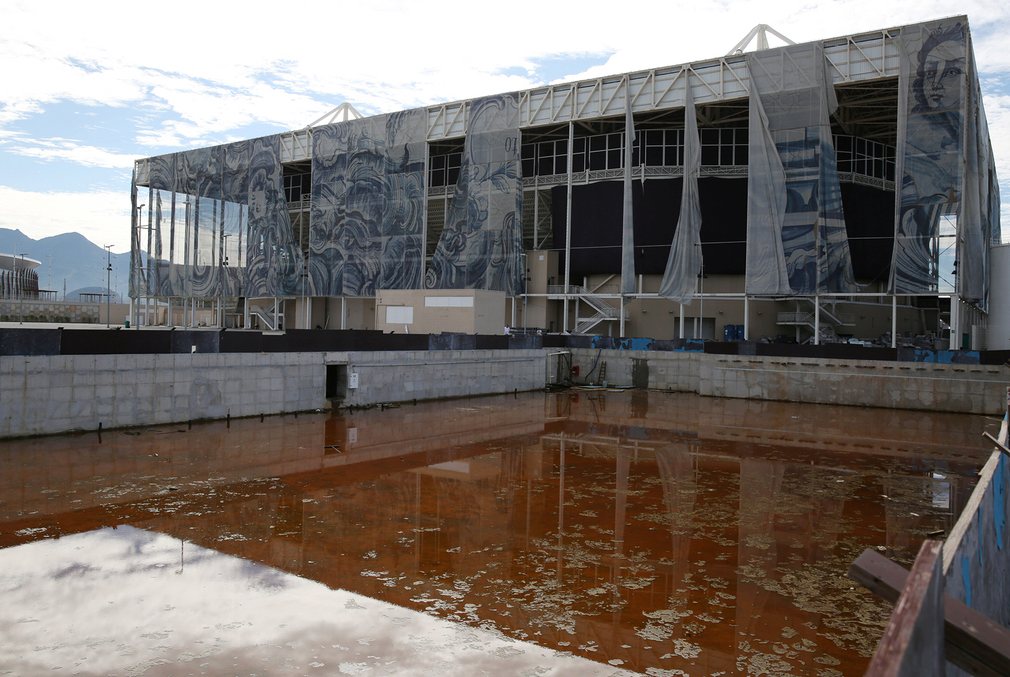By Jing Xu
BEIJING, Jan. 28 (Xinhua) -- A remarkably similar story is playing out in the former host cities of Olympic and Paralympic Games around the world. Venues sit empty, desolate.
These "Birds Nests," named after the iconic building built for the 2008 Beijing Games that has sat almost unused since the closing ceremony, are as much a testament to a country's former resolve to prove it's worth on the international stage as they are a testament to the fact that no nation, however rich or powerful, can easily find a continual use for large, cavernous venues meant to host international sporting events on the scale of the Olympics.

2016
 2017
2017
To take a look at some recent examples: the venues used to host the 2016 Rio Olympic Games were reported to be in disuse a mere six months after the curtains had fallen on the event. It's been widely reported that vandals and looters have ripped out thousands upon thousands of seats from the Maracana stadium, stripped the copper piping from air conditioning units for indoor venues, and pools that were supposed to remain open for locals to enjoy were overrun by bacterial growth and rendered useless due to a lack of the necessary continued maintenance.
Looking back further in history for another example, the venues constructed to host the 1996 Olympic Games in Atlanta were doomed to irrelevance almost out of the gate. Famously, the high rise apartments were still being constructed as athletes moved in ahead of the games. The construction of most of the infrastructure for the Atlanta Games was undertaken so hastily that quality suffered greatly. Apartment buildings that were supposed to be repurposed for renting out to the general public were never put on the market, and many have since been demolished. Many of the neighborhood in midtown Atlanta that played host to the residential building projects have been in an economic slump for decades, making the proposition of living there an unattractive one for many potential renters.
And of course, there is the namesake example of this phenomenon, the Bird's Nest in Beijing. While it has seen sporadic usage since the 2008 Games, it has nevertheless sat unused for most of the intervening time since the Games drew to a close.
These "Bird's Nests" create a number of problems for local communities. The cost of their upkeep can be a serious burden to taxpayers. Venues that sit unused for most of the year create very few stable jobs for those in the surrounding areas. Those that do have employment at the venues are vulnerable if the state decides to sell the structures to a private developer in a bid to recoup some of its investment.
All of this begs a simple, straightforward question: how is it that these venues can be repurposed? And can whatever solutions are found be implemented in such a way as to maximize their social benefit, provide a morale boost to local communities and an continuing economic boon to locales.
There are several things that can be done for Olympic host cities to avoid falling victim to the "Bird's Nest Syndrome."
First and foremost, venues should be constructed with long-term usage in mind from the outset. Residential projects should be built with an eye toward their being repurposed as affordable housing as a way to provide a boost to local communities. Volunteers and those who spent years working on behalf of an edition of the Games should be given priority to move into these housing projects as a way for the community to give back to them and reward them for their efforts.
On the competition venue side of things, the picture is a little more complicated but there are still things that can be done to ensure that these structures do not fall into disuse.
Large stadiums like the Maracana in Rio should be built in consultation with national sporting outfits so that they can immediately be repurposed to house teams. This will allow an entire national community to have an interest in and get behind the continued upkeep of these venues.
Another option is the route that Beijing has taken with its National Aquatics Center and other venues. Beijing make the conscious decision maintain these structures by repurposing them to house national-level sporting initiatives. This upkeep will pay off dividends for the country, as many of these buildings will be reused in the upcoming Beijing 2022 Winter Olympic Games.
The storied "Birds Nest Syndrome" is not an affliction that must necessarily come along with hosting an edition of the Olympic Games. Although the venues needed to host a Games are indeed expensive and can be difficult to find continual usage for, all that is required is a little creativity from policy makers.
With a little planning, foresight, and an eye toward long-term social benefit, host nations can turn what were long thought to be money-sinks into long term investments that will pay dividends for local communities and have a real, tangible, impact on the lives of ordinary people. (Jing Xu is a student from Canadian International School of Beijing; Edited by Spencer Musick)

